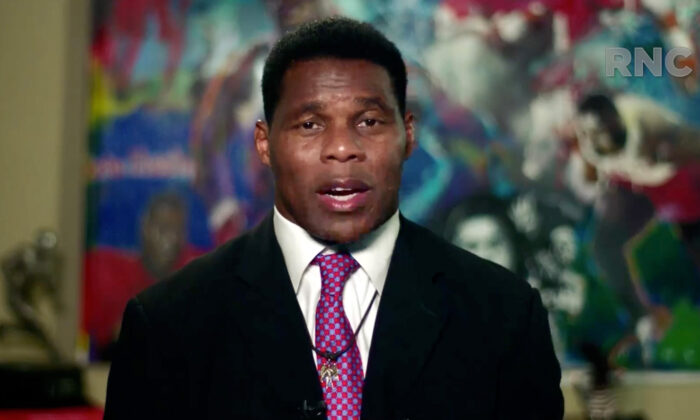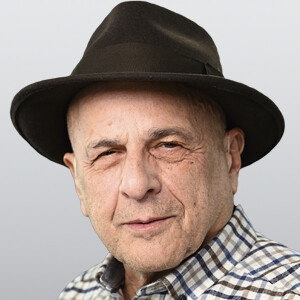In this screenshot, former NFL athlete Herschel Walker addresses the 2020 Republican National Convention on Aug. 24, 2020. (Courtesy of the Committee on Arrangements for the 2020 Republican National Committee via Getty Images)
Commentary
The Republican National Convention was barely halfway into its opening day when President Donald Trump materialized to deliver an hour-long speech.
Amazingly, because we have heard so many his orations long and longer, it was fun to watch and listen to, decidedly more interesting and content-filled than Joe Biden’s on the Democrats’ final night. Then, the primary takeaway was that the candidate had made it through without stumbling; the media declared that a triumph.
Be that as it may, no one in politics or in any of our lifetimes is a better extemporaneous speaker than Trump. People will point to others—Reagan, Clinton, Obama—all of whom have their points, but none of them would be competition for Trump.
He can move back and forth from serious to humorous with ease. If he ever wanted to, he would easily be the king of Late Night. No wonder Seth Meyers, Jimmy Kimmel, Stephen Colbert, et al., hate him so much. He’d eat their lunch.
Different Tones
But more importantly, from the outset, it was clear the dual (or is it dueling?) conventions demonstrated markedly different tones.
You could call the Democrats “medically gloomy”—they were banking on COVID-19 getting their man elected—and Republicans “optimistic, yet fed up.” They were optimistic about the future but fed up with the violence in the streets.
Speaking of “medically gloomy,” almost simultaneously with the Republican convention debut, Biden gave an interview in which he informed us he would “listen to the scientists” when it came to shutting down the country.
Which scientists, he didn’t say. Was it Dr. Anthony Fauci—director of the National Institute of Allergy and Infectious Diseases—who already has changed his mind about a half-dozen times? Or one of thousands of physicians—some epidemiologists, some not—who also have had opinions, many of which differed radically from Fauci’s (or whatever Fauci’s was at the moment)?
Biden—who, I would wager, wasn’t at the top of his class in chemistry or biology (he was at the bottom in law school, where he plagiarized)—isn’t the first person one would think of to make the necessary scientific determinations, but, hey, a Democratic candidate has to follow that “medically gloomy” line, just as Trump has to be enthusiastic about the FDA’s emergency approval of convalescent plasma.
It’s the old question of whether you’re a half-full or a half-empty person, and the Republicans are banking on the half-full side of the ledger. I’ll go with the former, too, but that’s my personality. I also happen to think that’s largely the American personality. We are at our best when optimistic. Everybody is, actually.
Optimism and pessimism tend to be self-fulfilling prophecies.
The first night of the Republican convention definitely accentuated the positive (but didn’t entirely eliminate negative… campaigning, that is. Why should they?)
“Celebrating America as the land of promise” were practically the first words of the narration that began the evening, just before the invocation by Cardinal Timothy Dolan that declared us, “One nation, under God.” That latter was, of course, somewhat different from the Democratic convention, at least in some instances, when the demiurge was notably missing from the Pledge of Allegiance.
Soon thereafter, Turning Point’s Charlie Kirk reminded us we should be “grateful, not angry, we live in the United States.”
Indeed.
Not a Racist
It was that kind of evening, with many moving speeches interspersed with some appearances by the president, most notable of which may have been when he was joined by several men and women who had been hostages in despotic countries such as North Korea and were freed by his administration.
Also memorable were a teacher inveighing against the teachers’ unions that restrict choice and Andrew Pollock, whose daughter was killed in the mass shooting at Stoneman Douglas High in Florida, speaking out passionately for the Second Amendment.
Cancer survivor Linda Hope must have driven the left crazy as an example of why socialized medicine is a dead end.
But the highlight of the evening was something that should put the fear of God in the hearts of Democrats, whether or not they are believers.
That was the several black people who supported Trump and who were more than willing to talk about the chokehold the Democratic Party has had on African Americans for half a century, what many correctly call plantation politics.
First came Kim Klacik, a young woman running for Congress from Baltimore. (You may have seen her terrific ad on the internet as she walks through her neighborhood.) She wants to make her long-benighted home city an example to the nation.
But then came the most powerful speaker of the night, in my view, former National Football League star-turned-businessman Herschel Walker. Walker, a black man, has known Trump for decades. He addressed the Democrats’ most sacred belief head on—that Trump is a racist. He looked square into the camera and denied it from the bottom of his heart.
“I have seen racism in my life and I know what it is, and it isn’t Donald Trump.”
Would you believe Walker or, say, Kamala Harris who accused her ticket partner of being both a racist and a sexual predator?
The other terrific speaker was Vernon Jones—a Democrat and Georgia state representative. He broke down that plantation ethic for the world to hear.
It’s hard to believe why any black people would vote Democratic anymore and this year maybe they won’t, at least to the extent they always have. We shall soon see.
After he said he was voting for Trump, Jones was threatened and asked to resign.
“The Democratic Party has become infected with intolerance,” he said.
That about sums it up.


No comments:
Post a Comment